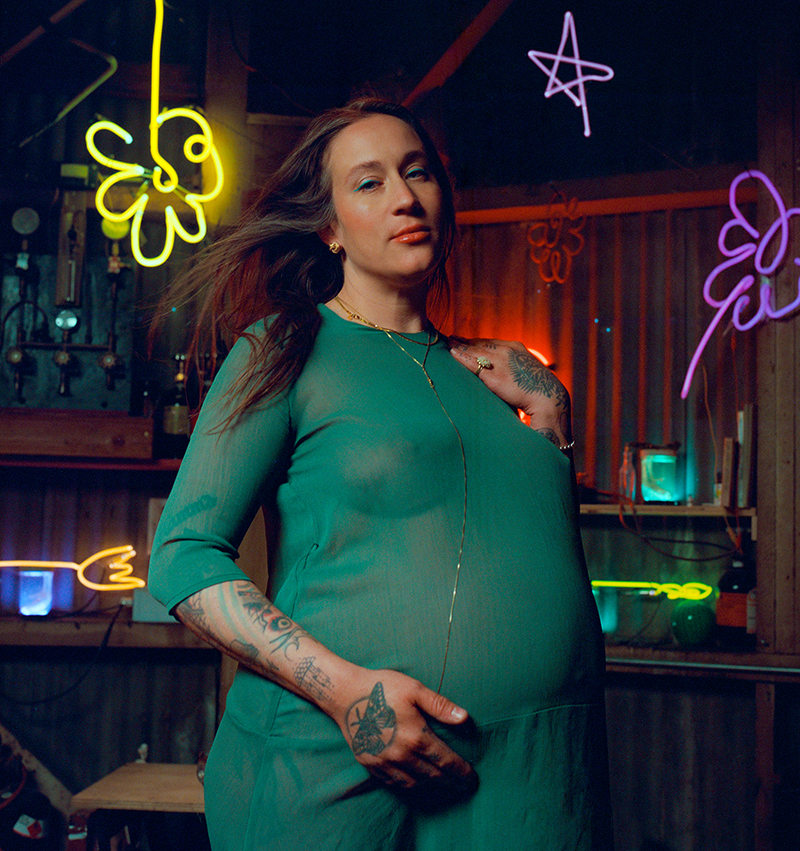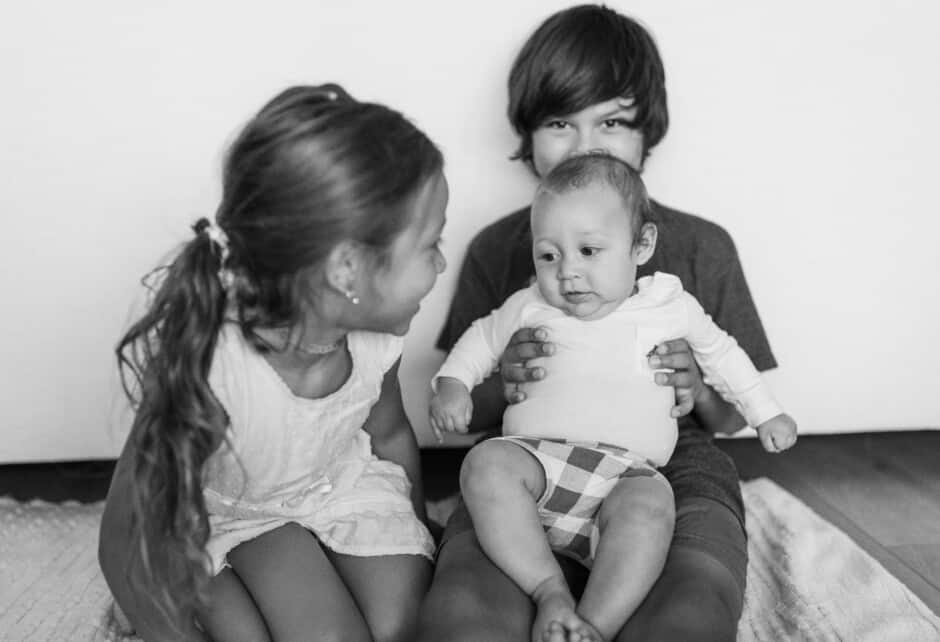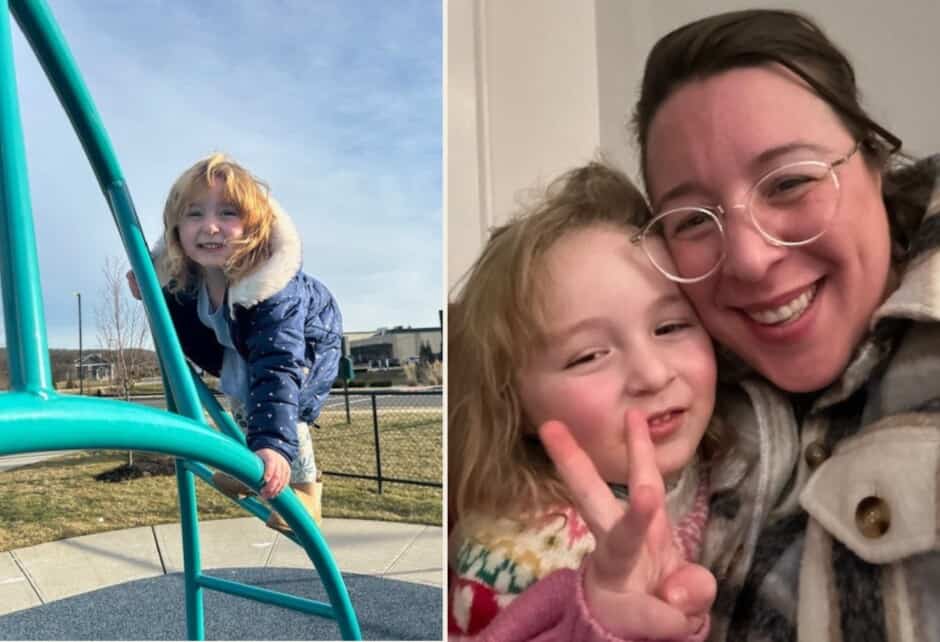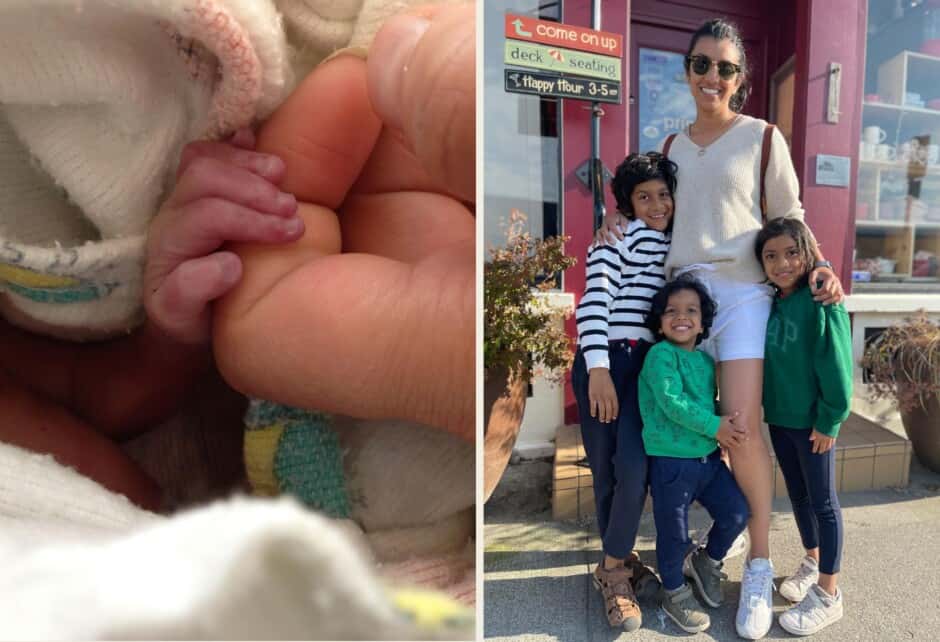
Mom Talk: Pregnancy After Loss On The Eve Of Mother’s Day
Written by Meryl Pataky
Photography by Deb Leal
Last year, to mark Mother’s Day 2021, we co-produced a stunning short film about the ups and downs of motherhood. (Watch “Mother Each Other” here!) One woman who shared her story so beautifully and openly was Meryl Pataky, an artist who bravely discussed longing to become a mother after suffering 2 miscarriages. Fast-forward to Mother’s Day 2022, and Meryl is deep into her third trimester, anxiously awaiting the arrival of her first child, a son. With the knowledge that Mother’s Day can be especially triggering to those who are trying to conceive and who have experienced pregnancy loss, Meryl has graciously written an essay acknowledging the rollercoaster of emotions while TTC and also the complex reality of pregnancy after loss. Be sure to follow @MerylPataky on Instagram to watch the rest of her story unfold.
One year ago, I was still trying to remain hopeful despite struggle and loss. Now, my feet are so swollen, I have a hard time walking at the end of the day. Sure, it sounds miserable, but one week away from giving birth and I am hanging on to every last drop of this pregnancy experience, trying to soak it all in. After 3 and a half years of trying and multiple miscarriages, my husband and I are now trying to find a place to store our buybuy Baby boxes and packing hospital bags with probably way too much stuff.
Of course, this upcoming Mother’s Day means the world to me. It’s just around the corner from my baby’s birthday. Mother’s Day has taken a few shapes over the years. It has transformed from decades of being a really hard day remembering the memory of my mother into an even harder day where that grief was compounded by the grief of lost pregnancies.
Now, it will be something very layered, a bit complicated and rich—there is still pain without my mother that grows with the knowledge that she won’t be with me on this motherhood journey. Ultimately, however, there is a lot to celebrate. I’m both terrified (I had a panic attack the other day) and excited. I’m sure plenty of polarizing feelings will follow me throughout this new experience, and I’m reminding myself to try and remain open to every facet.
I’ve been thinking back to 2019, just at the start of trying to conceive, and I remember the thoughts and feelings about motherhood I was experiencing at that time. What a different place I was in; I was working on a solo show entitled “Not Long For This World.” The concept of the show dealt with the complicated feelings of becoming a mother in the age of climate crisis. My anxieties at the time dealt with stuff far in the future and outside of my control. The flowers I made were representative of the fragility of childhood, of nature, of the future. Little did I know at the time that these fears of the future would be replaced by fears of perhaps never getting the experience at all. The flowers have followed me over the years on this journey and transformed in their meaning—there will always be fragility but also an endurance despite external conditions. We just recently used them in our maternity shoot in a really special way. It feels noteworthy to have a symbol, made in light, following me on this path.
On this Mother’s Day, I am thinking a lot about those who are still struggling to conceive. Since my pregnancy announcement on Instagram, some hopeful parents have reached out asking me to share things that worked for us. I had shared my struggles fairly publicly in the years preceding the announcement, but never anything comprehensive about methods and the things I’ve learned over those years of trying.
I’ve held this intention and would like to take this opportunity to share, as a sort of Mother’s Day gift to those still trying. Along with notes on what worked for us, I am also sharing some personal journal entries from my journey. I certainly don’t claim to have the magic answer and can only share what I learned in the hopes that passing it forward can empower someone else.
Journal Entry—October 24th, 2021 (9 weeks)
I find myself sitting down compelled to share, while at the same time really struggling with whether I should. Being in my own private world with this the third time around has felt like a blanket of comfort. I didn’t even tell my parents until last week. But, I know from the feedback I’ve received that sharing helps others and, if I’m honest, it helps me too. Maybe this can be therapeutic. And I’m sorry to anyone I’ve lied to before now.
One year and a half after my last miscarriage, I’m pregnant again. I’ve felt like if I don’t tell many people again, maybe I won’t jinx it like I did last time. There’s nothing worse than having to tell the world you told you were pregnant that you’re not anymore. There’s nothing worse than having to explain the story over and over. There’s nothing worse than hearing the same appeasements over and over—“you have plenty of time,” “at least it was early,” “it wasn’t your fault.” But, people mean well.
Four weeks pregnant for a woman who has miscarried in the past is an especially terrifying place to be. Most doctors don’t see you for your first visit until anywhere from 8-10 weeks along. When you call the office, they will ask for your last period, do the math, and schedule you that far out. If you’ve had a miscarriage and are anxious about this stretch, you are not alone and you can ask for things. For one, make sure to tell the person scheduling you that your doctor is aware that you have a history of miscarriage and you’d like closer attention during this phase. A doctor can schedule you as soon as 6 weeks and even see cardiac activity at this point. Your doctor can also order blood work to test hCG levels regularly up to 6 weeks to make sure the levels are rising. In the first 4 weeks of a viable pregnancy, hCG levels will typically double every 2 to 3 days.
Getting these test results every couple of days can be the one thing during this scary and fragile time that can provide some reassurance. On the in-between days, though, I would freak out if I didn’t feel a symptom or my trauma would convince me that it wasn’t real. Trauma is a very real entity that piggybacks onto this experience. It doesn’t want to allow you to be optimistic. My trauma was pretty well stored and settled, it had made itself at home and changed me tremendously.
Now, at 9 weeks 5 days, I’ve actually heard and seen a heartbeat. That’s much different from last time! But wait, trauma doesn’t allow me to be optimistic, so I remember that anything could still happen at this point. Every time I have a symptom, I’m grateful. When I feel normal, I panic. I haven’t felt the usual symptoms you hear and read about from friends and blogs. My breasts are sore, but I don’t feel like I want to throw up every day. The apps tell you the “regular” symptoms of pregnancy and so then you convince yourself that you must have an irregular one if your symptoms don’t align.
I find myself obsessively Googling “What are the chances a woman miscarries for a 3rd time?” and “Does no pregnancy symptoms mean miscarriage?” Want to know the answers? According to Mayo Clinic, the predicted risk of miscarriage in a future pregnancy remains about 20 percent after one miscarriage.
And no, lack of pregnancy symptoms don’t necessarily mean miscarriage. Trauma convinces you of all sorts of things. What the Google search results don’t tell you often enough: Every. Single. Pregnancy. Is. Different.
I heard a heartbeat. That’s farther than we’ve been before. As I wait for my next appointment at 10 weeks, I’m terrified. Everytime we go to the doctor, we hold hands and breathe together to calm ourselves down. Everytime we start the ultrasound, I look my doctor dead in the face to try and read her expressions. Last time she stared at the screen for too long, completely silent. If I see that again, I can brace myself. I wonder if I’ll even be able to enjoy any of this at all? We are further than we’ve ever been, and I guess we’ll just have to keep seeing week-to-week how much farther we’re able to get. It’s really one day at a time. How excruciating.
Journal Entry—November 1, 2021 (11 weeks)
Things are still trucking along. I’m now almost 11 weeks and almost out of the 1st trimester. My doctor feels really good about things and our NIPT screening came back low risk. She asked if we felt okay about our next appointment being in 5 weeks. I froze a little. Up until now, we’ve had ultrasounds almost every week. I nervously conceded to her confidence. She says everything is growing well and that, while it isn’t unheard of for something to happen at this point, she says it’s very rare. She said if I’m freaking out, I can always call and she will see me to check on things. Get you a doctor that treats you like that.
Brock and I went to lunch to recognize this positive progress and smile with each other. Even just now, I refrained from typing the word “celebrate” because I’m still so cautious. It is starting to feel more sure, though. We still have our Nuchal Translucency in a few weeks to do further screening for chromosome stuff. They test the fluid in the back of the baby’s neck. Apparently the ultrasound for this is super high def and very detailed. Dare I say, I’m excited.

Things I’ve Learned + What Worked For Us
Doctor Stuff
Unfortunately, many OB’s will encourage you to try for at least a year before they start to recognize any issues with fertility. Even still, some won’t spring into action after the first miscarriage. I think I remember one of my doctors saying the recommendation for diagnosing an issue is after 3 miscarriages. The thing about miscarriages is that while it’s traumatic and very sad, it’s completely normal and happens frequently. What I would suggest is to talk to your doctor about their methods and theories here. If you are over a certain age, maybe ask or push for advanced screenings.
I saw a reproductive endocrinologist after our second miscarriage. I was referred to the Reproductive Science Center, who tested me and consulted with me about IVF and IUI options. I’ve heard that Kind Body will do similar testing and also facilitate treatment. Although I didn’t go down the IVF path, my endocrinologist did discover that my thyroid levels needed adjustment. What’s super important to note here is that my OB and most physicians would say that my levels were within normal range. An endocrinologist, however, is anal about these numbers for fertility and put me on a low dose of levothyroxine for hypoactive thyroid. This means that my thyroid was working overtime to create the hormone, which results in a higher than ideal number. An endocrinologist wants the numbers at 2 or below. A physician will see anything around 5 and under as “normal.” So, this is to say, stay on top of these things and maybe get second opinions. Try and see an endocrine doctor if you can. Thyroid issues can be a huge factor in issues with fertility and miscarriage and are common in women.
Get your partner (if cis-male) tested as well! Lifestyle and dietary habits can affect sperm. Also, if your partner is going more than a week without releasing his “junk,” tell him to masturbate or have some fun mid-cycle sex for no utilitarian reason! You want fresh and rejuvenated sperm stepping up to the plate when it’s time, not stuff that’s been sitting in his system for a long period of time. There is a study that suggests that 1 day of ejaculatory abstinence in between trying is better than 4 days. Ultimately, Brock’s tests came back normal, but there were things we did to stack the deck for him too. He limited his smoking and drinking, he continued with exercise, we tried sex in the mornings mostly, he took some supplements, he made sure not to have stale junk and my doctor also suggested that my husband try and keep a pillow in between his lap and his laptop. (Read more sperm tips here).
Process and Outlook
I prefer the strips for ovulation testing. This means peeing in a cup and dipping the strip or peeing on the strip directly. The apps aren’t always entirely accurate with your cycle but they can help to narrow down a fertile window. So, don’t JUST use the apps. The expensive watches that you go to bed with—I didn’t like it. My friend bought me one that ended up not working and it was a hassle to return and get another and ultimately it just didn’t work for me. These watches just measure your basal temperature, which you can also do on your own without a fancy gadget. Temperature will rise around ovulation. Test in the mornings.
You should still always test during the “fertile period.” Most people think they need to have sex every day of their fertile week just in case or to stack the deck, but this is tiring and unnecessary because it takes just one moment to get pregnant! The sperm needs to meet the egg at the exact point of release or inside the fallopian tube. This means that if you can predict when your strip will be positive, have sex the day before, and the day of. For me, I was testing my ovulation that week, I missed a day of testing and then the next morning we had sex (twice in a row). I tested my ovulation immediately after we had sex and it showed a positive. Unfortunately, because I missed a day, I’m unsure if it would have shown positive the day before or not. I suspect that I happened to time things perfectly and that that morning was the first day I had positive ovulation. All of this is to say that it just takes one day, right at the point of ovulation. Having sex all week just in case just makes things feel non-fun and like work.
I asked my husband what he thought worked. He says, “thinking about things outside of the pregnancy and getting things aligned in order to make it happen.” I think he means energetically and spatially. We purchased a house and moved in the summer of 2021. He believes that if we didn’t get the house it may not have worked. Right after we moved in and focused on house repairs, we got pregnant.
What they say may be true, that if you stop thinking about it and focusing on it so intensely, that it happens. As infuriating and difficult as that sounds, there’s probably something to it. The tangible and the spiritual pathways we laid down for ourselves kept our minds and bodies occupied. A big aim of ours as well was making sure that sex didn’t feel like a chore.
Acupuncture
I was seeing an acupuncturist whom I do not credit for my success whatsoever. The reason I say this is because I have had a different practitioner since I became pregnant and I now realize what good acupuncture should be. So, I did manage to become pregnant successfully without acupuncture. However, I still would recommend seeking out treatment from a practitioner that specializes in fertility and pregnancy if it’s accessible to you. Acupuncture, at the very least, can help to relieve stress, which is super important. I acknowledge that this treatment isn’t always super accessible to everyone due to it being cost prohibitive or outside of insurance coverage. I would encourage you to call your insurance to see what exceptions could be made, if any. There are practitioners that offer sliding-scale services. There is a network called American Specialty Health to look into to see if it can help provide services for things like chiropractors and acupuncturists.
Accessibility
Keep in mind that infertility is a diagnosed medical condition. Make sure to ask your insurance what is covered under this diagnosis and advocate for yourself whenever possible. Not many insurance companies have fertility coverage, but perhaps there’s another medical condition that contributes to the infertility that you can piggyback onto.
Supplements and Medicinal
I took Arctic Cod Liver Oil the entire time I’ve been trying. It’s good for follicle stimulating hormones. I also took a supplement called CoQ10 and so did my partner. You can read about it here. I’ve been taking prenatals ever since I started trying to get pregnant 2 years ago.
Progesterone
My OB is friends with a fertility doctor who sometimes gives her patients progesterone suppositories (intra-vaginal) to help during ovulation. There was nothing wrong with my progesterone levels, but my OB prescribed them to me just to “stack the deck” so to speak. I took 2 suppositories a day, as soon as I tested positive on ovulation strips. I was instructed to take them everyday until I either get a period OR if I got pregnant, continue taking them through the 1st trimester.
Progesterone is of huge importance in this process as it assists in the development of the embryo in the absence of a placenta. It also tells your immune system to leave the embryo alone. Progesterone levels are supposed to begin to rise at ovulation and they will peak around 21 days of your cycle. Some women will experience symptoms of this spike, like headaches and muscle/joint aches. When I started to become more in tune with my cycles, I’d recognize feelings associated with each phase of the cycle. If you see an endocrinologist, they will test your progesterone levels at certain times of your cycle.
Another thing I took—and still take everyday—is low dose Aspirin (“baby aspirin”). Sometimes a clotting disorder or tendency can be a cause for miscarriage. This is also something that an endocrinologist will test for and my OB prescribed the baby aspirin along with the progesterone because “it couldn’t hurt.”
Diet
I recommend looking into a book called In the FLO. This book definitely has some great tips for nutrition and proposes a very sensical perspective around women’s cycles and their diet. The book says that, whether getting pregnant or not, women should be adjusting their diets for different phases of their cycle and the 28 day calendar. Many of the dietary theories are based in traditional Chinese medicine. It’s a great book with lots of interesting knowledge and the ideas feel very harmonious. At the same time I will say, don’t chain yourself to it and splurge on everything it recommends or stress yourself out.
Just remember—whether you eat this thing or that or take this supplement or that, or spend tons of money on a fridge full of all new food items mid-month, it’s not going to be the “make or break” of getting pregnant. I took some of the advice in this book like reducing or, at times, eliminating my soy intake, reducing sugars, and taking some of the supplements like Cod Liver Oil. Always ask your doctors about taking supplements in combination with any medications you are taking. For example, I started taking spirulina suggested in the book and then learned that it reacted poorly with my thyroid meds.
If you are vegetarian, it’s so super important to take the time to prep and create good vegetarian meals and not high carb and processed stuff. I was a pescetarian for a few years leading up to trying and only switched over to some chicken here and there right before we got pregnant. I have zero idea if this made an impact or not. I cooked a lot of meals at home and tried to do well with my vegetarian dishes—not using tons of processed stuff or store-bought meat alternatives.
That said, my diet needed to change and did change during our move and house flip because the pace of life changed. I started eating more animal protein (still no red meat or pork) because during the time of our move I wasn’t feeling satiated. Of course, I have no idea how this impacted anything if at all and I’m not suggesting that a vegetarian has to switch to animal protein to get pregnant.
Spirituality
I’m just going to put this out there—during the year and a half that we suffered tragedy, I connected to spirit. I had always been aware of astrology and spiritualism, but I took a super deep dive during this time. As woo woo and unrealistic as this sounds, I believe that it changed my inner workings and my attitude towards this process. “Magic is the science and art of making change in accordance to the will” says Aleister Crowley.
It helped me to feel empowered and in my own body. I felt in control of my energy and identified my shadows to examine and banish. I journaled with the moon cycles and created rituals as the themes of the cycles changed. I created some of my own oils to use and shared some vials with some friends, sent care packages to a few friends, and received some as well. I think that was a nice energy exchange. I think being in touch with the moon cycles is pretty important for this process. Even my very practical husband would tell you he thinks it really helped and contributed. He even got in on some rituals with me, which I think is important too. If you have a baby making or parenting partner, invite them into this personal energetic space.
Are you a mother with something to say? Send us an email to be considered for our “Mom Talk” column.
Share this story



